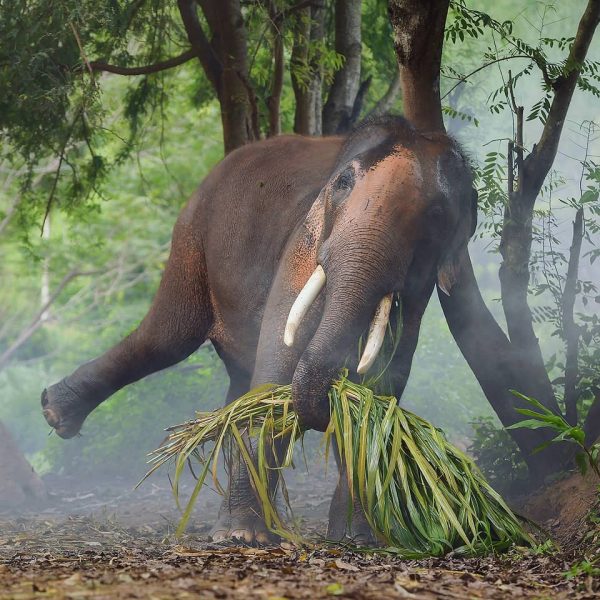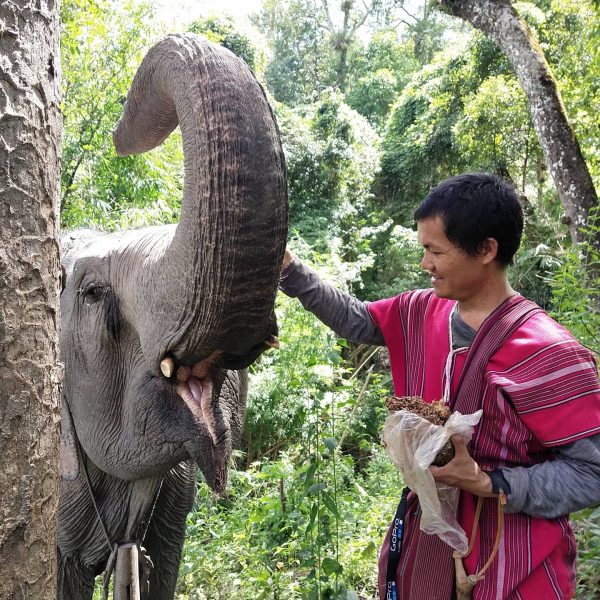Meet Phu Jan!
Phu Jan is one of the 7 Karen Tribe elephants, living in a small village in North of Thailand. Phu Jan is 37 years old, he is the biggest one in the family and weights around 4500 kilos. You might have been lucky (like me) to meet Phu Jan, see his clumsy moves and even experience his big appetite for bananas.

Phu Jan is enjoying his meal

David with Sun, the owner of Karen Tribe Experiences
All of our elephants love people and have grown up with them their entire lives. Unlike other sanctuaries, we do not have tens or hundreds of visitors coming through a day to see or touch our elephants. Instead, we value and take pride in the one on one experiences that we provide to each of our guests.
Karen Tribe Elephants do not have duties of being a ride for tourists or posing for photos, they are an integral part of the village life here in Chiang Mai. When you visit the Karen Tribe, you will learn about elephant health, the signs of happy and sick elephants, chopping down banana trees, and making nutritious vitamin balls. Each of these tasks will get you one step closer to understanding what it takes to care for our 7 elephants like family.
We are one of the oldest and last-remaining hill tribes in Thailand. Each of our elephants have experienced a close connection with the Karen Tribe as we have been their providers, friends, and loyal companions throughout their entire lifetime. Ethical tribes like the Karen Tribe do not see elephants as money-generating creatures, but a part of the family that we can genuinely care for and provide unconditional dedication to. This also allows us to share our traditional practices with the public to further our mission to create a world where humans and elephants coexist in harmony through care, respect, and sustainability.
Sponsor an Elephant
Sponsor an elephant of your choice with a monthly payment of 500 Baht to receive a monthly update on your elephant and a photo through your email.
Did you know an elephant eats 1/10th of their body weight per day? Feeding one of our elephants a day costs about 500 Baht (roughly 15 Euros). Feeding all 7 of our elephants costs about 3,500 Baht a day (roughly 105 Euros). This is a lot of money for a Thai Family and a small sanctuary that values the wellbeing of our elephants. Any contribution you make will help us keep them happy and healthy in their natural environment surrounded by caretakers who see them as part of the family.
What can you do to help?
- Spread the word by sharing our mission!
- Get in touch with us for more information & volunteer opportunities!
- Donate to the Karen Tribe on Paypal (karentribenativeelephants@gmail.com). Every little bit counts!
Don’t know how much you should donate? It costs 15€ a day to feed one elephant. There are 7 elephants in the Karen family. Any amount is very generous & greatly appreciated.
Written By: Krystal Christopher & Mitchell Saucedo-Trinidad (Morehead-Cain Scholars & Volunteers)
MAKE A DONATION
Go to wise.com, select ‘‘Send Payment’ using the email address Karentribenativeelephants@gmail.com or Click Donate Button Donate with Wise.
